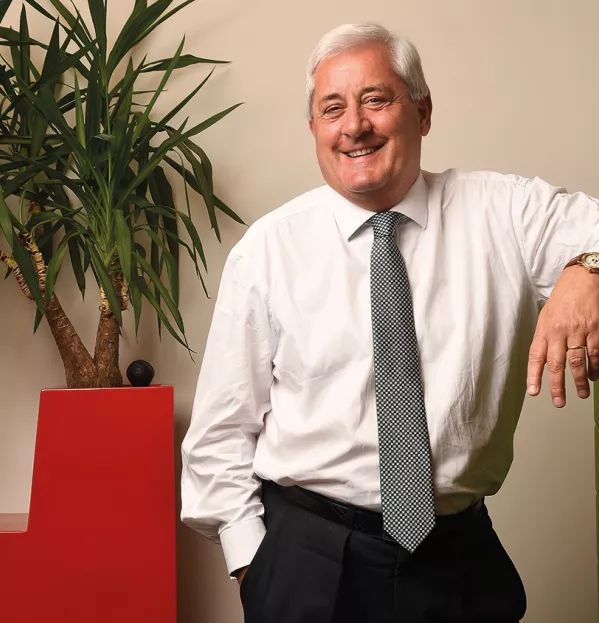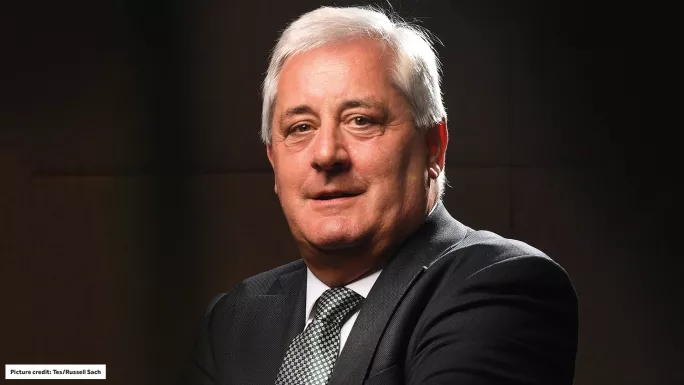‘We need to be excited about teaching, proud about it, appreciative of it’

Paul Drechsler could well be Britain’s most enthusiastic cheerleader for teachers. “The most important - the most important - role in this country, if you care about the future of this country, is to be a teacher,” the president of the Confederation of British Industries says with utter conviction. “No question.”
But Drechsler - who is also the chair of Teach First - thinks the profession is being let down by a toxic combination of national negativity, the elevation of ideology over evidence and chronic short-termism.
He wants society to shout its praises of teachers from the rooftops. And he’s calling for an independent commission to stop education being used as a political football.
Sitting in the CBI’s plate glass HQ above Cannon Street station, the avuncular Irishman recalls how he came to be involved in the world of education.

Drechsler was born and bred in Dublin to an Irish mother and a Czech father. His father was forced to flee Czechoslovakia as a Jewish refugee in 1939 and arrived in Ireland at the age of 16. “He was sent there ahead of his parents,” Drechsler explains. “They didn’t make it.”
Drechsler says he was “very lucky” to have a nurturing educational environment at home. His father finished his schooling in Ireland and did well at university, and his mother was an “avid book reader”. “My mother must have given me a book every week from when I could open my eyes,” he remembers cheerfully.
After studying engineering at Trinity College Dublin, he crossed the Irish Sea to work for chemical company ICI, on Teesside. A globetrotting career followed, which took Drechsler to Brazil and the US. But he returned to the UK and worked in London so he could “put my children in the same schools for more than two years running”.
‘Shocked by the deprivation’
It was his job leading the construction firm Wates Group that really catalysed Drechsler’s interest in education. One of the company’s biggest businesses was refurbishing social housing, and Drechsler says he was “absolutely shocked” by the deprivation he encountered “in the fifth richest country in the world”.
This led him to get involved with Business in the Community, the charity that promotes corporate responsibility. “The more I got to understand about poverty, the more I came to believe that the only way to address poverty is through education,” he says.
“That made me ask the question: ‘What can we in business do to make a difference in support of education?’ ”
Drechsler took over as chair of Teach First in January 2014, but he has been equally willing to intervene in the education debate wearing his CBI hat (he was elected president of the business lobbying organisation in July 2015, and is now coming to the end of his three-year term).
At the Association of School and College Leaders conference in March, he gently warned delegates against too much rote learning in schools.
But while some people might try to hold him up as an unlikely champion of progressive education, Drechsler is too canny to blunder into what he calls a pedagogical “minefield”.
“As long as you come out of the school system with the right combination of a solid knowledge foundation and a broad palette of skills, then you can seize opportunities,” he says diplomatically. “I leave it to the world of education to decide the best way to get there.”
Drechsler thinks there are three key areas where business can help schools. First, business knows “quite a bit about leadership and governance” - it can provide much-needed school governors and help to coach school leaders. The second area is “enterprise and employability” - businesses linking up with schools to provide work experience and careers support. Finally, there’s “curriculum support”: “There’s no subject in school where there isn’t a perspective from the world of business that might be brought in to help pupils understand the relevance of the subject to the world outside,” Drechsler says.
He might have an array of support to offer schools, but will teachers be interested in Drechsler’s wares?
It’s no secret that in an often left-leaning profession, many teachers see the influence of business as a cause for concern - from the alleged “marketisation” of education to the remuneration of “fat cat” academy chief executives, whose salaries are based on norms imported from the commercial sector.
Drechsler doesn’t shirk from this issue - business has a “reputational challenge”, he admits. “Our standing and reputation as business is not where it should be, and we need to do more about it.”
He thinks the best way to address this is through “practical action”. “If we’re supporting teachers, helping them where they need help, we will get due recognition for it,” he insists.
But he’s a little more slippery on the subject of executive pay. Asked whether six-figure salaries are appropriate for school leaders, he launches into a long answer about education’s key priorities. “When we have an education system that delivers the output commensurate with our world standing, then we can start to worry about other issues,” he concludes.
For Drechsler, the biggest issue facing the teaching profession is recruitment. “If that is not a national challenge, what is?” He believes the solution to the crisis lies in the national conversation we have about teaching and “our collective branding” of the profession.
If Drechsler was already sounding enthusiastic about teaching, at this point he turns the dial up to 11. “We need to recognise that if we want more people to be teachers, we need to be excited about it, proud about it, appreciative of it!” he bellows.
Conversely, the prevailing “national narrative” about teachers needs to be “challenged”. “We seem all to be too comfortable talking about the negatives,” he says, sternly.
It’s the impact on the teaching “brand” that makes Drechsler a vocal advocate for Teach First. “It is the most significant positive intervention in education in this country probably for the past 10 or 15 years,” he says.
“Why? Because of what I think it has done to improve and raise the brand of teaching.”
One of the greatest selling points of the profession, he says, is the visibility of a teacher’s impact. “Very often in business, it takes a long time to see the impact of what you do. If you’re a teacher in a classroom you see that impact day in, day out.”
Warming to his theme, he goes on: “I mean, in a classroom, you have live measurement - it’s like a dashboard on a car. It’s all these little human faces and you know if you’re having an impact.”
Head above the parapet
Drechsler also wants to take on short-termist attitudes in education along with politicians who lean too heavily on ideology rather than evidence.
“I just couldn’t believe my eyes when I read that in the past 30 years there have been 14 secretaries of state for education,” he says, aghast. “How can you run a world-class system if the person who is championing it on behalf of the nation changes every two years? We couldn’t run business that way, that’s for certain.”
To bring more permanence and objectivity to policymaking, the CBI is calling for an independent commission to determine the future direction of education - although it seems unlikely that politicians will relinquish the levers of power controlling our school system any time soon.
It’s not the only issue on which Drechsler is ready to put his head above the parapet. On funding, he says: “I haven’t been to a school anywhere in the past year or two that doesn’t have in its key challenges school funding. I cannot think of a smarter place to allocate scarce resources than education, if what you’re interested in is the long-term competitive success of your nation.”
He has also been outspoken over Brexit and worries that the government’s focus on exiting the EU could result in the neglect of education. “As long as we are wrestling with the challenges of Brexit, inevitably we’re not going to be putting as much time, as much effort into other areas,” he says.
But that’s not his only concern about the impact on schools. Drechsler says that Brexit has “increased the volume on the issue of immigration”. “We need a much more positive discussion about immigration in this country, so that our children going into school - wherever they come from - feel they are loved, welcomed and appreciated. The Brexit dimension I’d be worried about is how we do not light a fuse - racist dialogue, intimidation, bullying, all of the things that schools have to contend with - through this lens of immigration.”
But if Drechsler really does regard teaching as the most important profession in the country, did he ever wish he’d gone into the classroom instead of becoming a captain of industry? He leans forward conspiratorially. “I’m going to give you an exclusive, because I like you,” he whispers. “In 1977, I was a teacher of Spanish students learning English in Dublin. I learned then that it really was not for me.”
Now, as Teach First chair, Drechsler goes back to school once a year to teach a class. “It is the most demanding, most challenging, the most time-consuming, the most frightening job,” he says.
“I can stand up in front of four or five thousand people at the CBI conference and I’m happy as a sandboy. Put me in front of 30 or so 15-year-olds and I am just jelly.
“To be very clear, it’s an exciting job, teaching. But it’s not for the fainthearted.”
You need a Tes subscription to read this article
Subscribe now to read this article and get other subscriber-only content:
- Unlimited access to all Tes magazine content
- Exclusive subscriber-only stories
- Award-winning email newsletters
Already a subscriber? Log in
You need a subscription to read this article
Subscribe now to read this article and get other subscriber-only content, including:
- Unlimited access to all Tes magazine content
- Exclusive subscriber-only stories
- Award-winning email newsletters